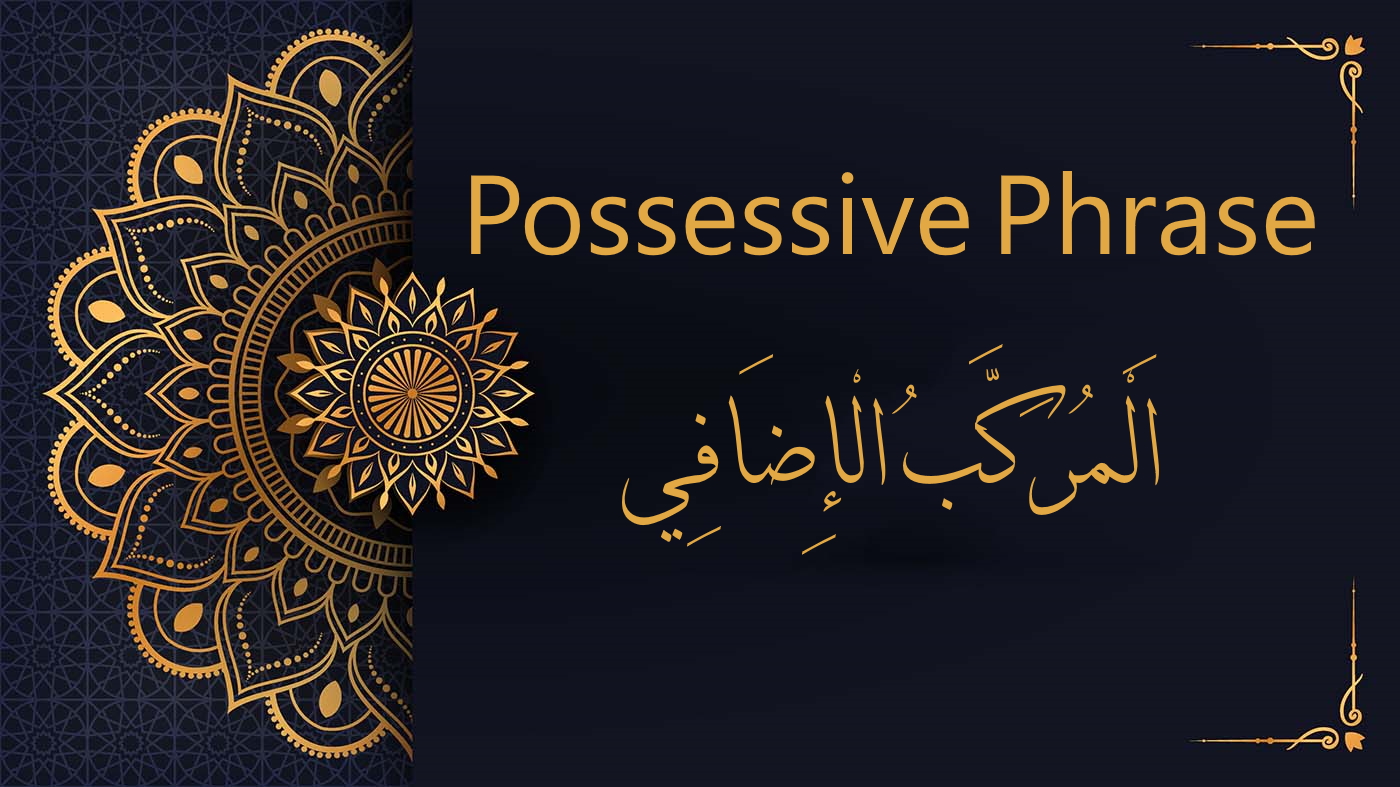
In Arabic, the possessive phrase represents a union of two nouns. The first noun signifies the object being owned, while the second noun denotes the possessor or owner. Together, they convey a relationship of ownership or affiliation.
Examples:
نَارُ اللَّهِ
Allah’s fire/fire of Allah
رَسُولُ اللَّهِ
Allah’s Prophet
نَصْرُ اللَّهِ
Allah’s help
حَدِيْثُ الجُنُودِ
The story of the armies
حِزْبُ الشَّيْطَانِ
The group of satans
صَاحِبُ الْحُوْتِ
The companion of the fish
يَوْمُ الْفَصْلِ
The day of decision
In English, possession is typically indicated by appending an apostrophe followed by an “S” or by employing the preposition “of,” as illustrated in the preceding examples.
Within a possessive phrase, the initial noun, signifying the item or entity being owned, is termed the “possessed” اَلْمُضَافُ and the second noun is called “possessor”: اَلْمُضَافُ إِلَيْهِ.
In Arabic grammar, the term ‘al Mudaf’ or اَلْمُضَافُ always refers to an indefinite noun, and as such, it never carries the definite article ‘اَلْ’ preceding it.
In Arabic, اَلْمُضَافُ can be marked with any of the short vowel signs – dammah, fatha, or kasrah. However, it distinctly lacks the nunnation (tanween).
Conversely, the second noun, known as اَلْمُضَافُ إِلَيْهِ, is most often a proper noun. If not inherently definite, it gains particularity by having the prefix ‘اَلْ’ attached to it.
إِنَّهُ لَقَوْلُ رَسُولٍ كَرِيمٍ
[That] indeed, the Qur’an is the word of a noble Messenger. (69:40)
وَجَزَاءُ سَيِّئَةٍ سَيِّئَةٌ مِّثْلُهَا
And the retribution for an evil act is an evil one like it, (42:40)
فَمَن يَعْمَلْ مِثْقَالَ ذَرَّةٍ خَيْرًا يَرَهُ
So whoever does an atom’s weight of good will see it (99:7)
وَمِن شَرِّ حَاسِدٍ إِذَا حَسَدَ
And from the evil of an envier when he envies.” (113:5)
In Arabic grammar, the final letter of اَلْمُضَافُ إِلَيْهِ consistently carries a tanween kasrah or a single kasrah, marking it as genitive in case.
Additionally, while اَلْمُضَافُ إِلَيْهِ can take the form of a pronoun, this pronoun variant does not have a kasrah affixed to it.
وَلِأُتِمَّ نِعْمَتِي عَلَيْكُمْ
and that you may be guided. (2:150)
مَا أَغْنَىٰ عَنْهُ مَالُهُ وَمَا كَسَبَ
His wealth will not avail him or that which he gained. (111:2)
وَاللَّـهُ وَلِيُّهُمَا ۗ وَعَلَى اللَّـهِ فَلْيَتَوَكَّلِ الْمُؤْمِنُونَ
but Allah was their ally, and upon Allah, the believers should rely. (3:122)
وَإِن تَصْبِرُوا وَتَتَّقُوا لَا يَضُرُّكُمْ كَيْدُهُمْ شَيْئًا
And if you are patient and fear Allah, their plot will not harm you at all (3:120)
فِي جِيدِهَا حَبْلٌ مِّن مَّسَدٍ
Around her neck is a rope of [twisted] fiber. (111:5)
لَكُمْ دِينُكُمْ وَلِيَ دِينِ
For you is your religion, and for me, is my religion.” (109:6)
وَاعْتَصِمُوا بِحَبْلِ اللَّـهِ جَمِيعًا وَلَا تَفَرَّقُوا
And hold firmly to the rope of Allah all together and do not become divided. (3:103)
In Arabic grammar, when the اَلْمُضَافُ is in a dual or plural form, the ن (noon) from its ending is omitted in the context of possession. As a result:
فَجَعَلْنَاهَا نَكَالًا لِّمَا بَيْنَ يَدَيْهَا وَمَا خَلْفَهَا وَمَوْعِظَةً لِّلْمُتَّقِينَ
And We made it a deterrent punishment for those who were present and those who succeeded [them] and a lesson for those who fear Allah. (2:66)
يَا بَنِي إِسْرَائِيلَ اذْكُرُوا نِعْمَتِيَ الَّتِي أَنْعَمْتُ عَلَيْكُمْ
O Children of Israel, remember My favor which I have bestowed upon (2:40)
Note: In Arabic, body parts that naturally come in pairs (like eyes or hands) are always represented in the dual form and are grammatically treated as feminine.
Additionally, when a demonstrative noun appears within a possessive sentence, it follows the possessive phrase.
Examples include:
قَالَ إِنِّي أُرِيدُ أَنْ أُنكِحَكَ إِحْدَى ابْنَتَيَّ هَاتَيْنِ
He said, “Indeed, I wish to wed you one of these, my two daughters (28:27)
اذْهَبُوا بِقَمِيصِي هَـٰذَا
Take this, my shirt (12:93)
This lesson on Arabic nuances concludes here. Insha’Allah, our subsequent session will delve into the descriptive phrase in Arabic.
Al-dirassa Institute invites you on a linguistic journey with our expert teachers to master the Arabic language. Should you wish to further your studies, we welcome your inquiries.
Discover the experiences of our delighted clients who have thoroughly enjoyed utilizing this standout feature.
Alhamdulillah I‘m very pleased with the arabic and Qur’an lessons I receive from teacher Umm Tasneem and I‘m also content with the al-dirassa administration team who were very quick in answering any questions I had. In a month I progressed a lot and I cannot wait to continue my studies with al-dirassa. May Allah reward everyone at al-dirassa.
Verified review - view original
My Qur’an teacher is fantastic, she teaches me in a loving and kind way where I look forward to the lessons and learn so much. My Arabic teacher is equally as nice and has a lot of patience with me, she has great expertise in the field and I’ve progressed really quickly with her. Thank you Al-dirassa!
Verified review - view original
Don’t want to go through the translation anymore?
30 free minutes with your qualified Egyptian teacher.

Al-dirassa Institute offers you a gift to help you begin your journey to being fluent in Arabic and learning the Quran.

Al-dirassa Institute offers you a gift to help you begin your journey to being fluent in Arabic and learning the Quran.